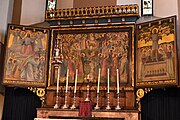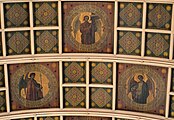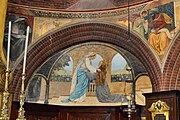Nathaniel Westlake
Nathaniel Hubert John Westlake (N H J Westlake) FSA (1833–1921) was a 19th-century British artist specialising in stained glass.[1]
Career[]
Westlake began to design for the firm of Lavers & Barraud, Ecclesiastical Designers, in 1858, and became a partner ten years later, making the firm Lavers, Barraud and Westlake, of which he became sole proprietor in 1880.[2] The firm was then known as Lavers & Westlake.
A leading designer of the Gothic Revival movement, his works include The Vision of Beatrice (1864), commissioned for an exhibition of stained glass held at the South Kensington Museum (renamed the Victoria and Albert Museum in 1899).[3]
In 1896, Lavers & Westlake were commissioned to reglaze two central lights in the great hall windows at Mary Datchelor Girls' School, Camberwell. The subjects were 'Lady Jane Grey discourses with Roger Ascham' and 'By Industry and Perseverance', symbolising the importance of female endeavour in higher education. Other windows included 'On the way to Chapel', 'Physical Exercise', 'The Kindergarten' and 'The Classroom'. The windows were removed from the school in 2010 after it was converted into a series of apartments.[4]
Westlake published under the name of "Nat Hubert John Westlake".[5]
Works[]
Stained glass[]
- Windows, Lady Chapel, and Stations of the Cross, .[6]
- Windows at Arundel Cathedral.
- Five-light window at Napier Cathedral, New Zealand, 1889-90 (destroyed in 1931 earthquake).[7]
- Windows at Our Lady the Immaculate Conception Church, Devizes, Wiltshire, 1909.
- Windows at All Saints, Higher Walton, Lancashire.
- Windows at Mary Datchelor Girls' School, Camberwell, south London.[4]
- Windows at St Lawrence's Church, Westlake (Essex)[8]
- The Gordon Window in Booloominbah[9]
- Windows and murals at the Church of the Sacred Heart, Hove. The final work before his death was the stained glass above the doorway on the southwest side.[10]
- Windows of Marble Chapel in Mount Stuart House, Isle of Bute.
- Windows of chapel at St Micheal's Cemetery, Rivelin,Sheffield.
Paintings[]
- The vaulted ceiling of St Joseph's Church, Highgate (considered one of Westlake's finest works)
- Reredos in St Charles Borromeo Church, Westminster
- The triptych behind the altar at St John the Divine, Richmond, London, completed in 1908. Westlake also painted the sanctuary ceiling, which illustrates passages from the Book of Revelation, chapter 14, and stations of the cross which are now missing.
- Wall paintings in St Mary Magdalene, Enfield.
- Paintings in the arcade spandrels at St Mary's, Bourne Street, London.
- The sanctuary ceiling and Stations of the Cross, Church of St Francis of Assisi, Notting Hill, London.
Books[]
- A souvenir of the exhibition of Christian art, held at Mechlin, in September, mdccclxiv, [1864] in a series of sketches, with descriptive letterpress (1866)
- Via Crucis, the way of the Cross in fourteen stations [plates]. (1876)
- A History of Design in Painted Glass, Volume 1 (1881)
- A History of Design in Painted Glass. Four volumes (1891–1894)
- An elementary history of design in mural painting principally during the Christian era (1901)
- History of Design in Mural Painting from the Earliest Times to the Twelfth Century: From the second until the twelfth centuries AD In two volumes. (1905) J. Parker, London[11]
- The dance: historic illustrations of dancing from 3300 B.C. to 1911 A.D., by an antiquary. (1911)
Gallery[]

St Mary Magdalene, Enfield

Ceiling, St John the Divine, Richmond

Triptych, St John the Divine, Richmond

St Charles Borromeo Catholic Church, high altar reredos

Painted ceiling at St Joseph's Church, Highgate

Painted ceiling at St Joseph's Church, Highgate

St Mary's Church, Bourne Street
Plaque[]
There is a plaque on 20 Endell Street, which was Westlake's home during the 1880s, next to the offices of Lavers and Barraud.[12]
References[]
- ^ Joyce Little, Stained Glass Marks and Monograms (London: National Association of Decorative and Fine Art Societies, 2002), p. 77.
- ^ Gordon Campbell (ed.), Grove Encyclopedia of Decorative Arts, vol. 1 (Oxford University Press, 2006), p. 21.
- ^ Victoria and Albert Museum Featured Glass Panels: The Vision of Beatrice
- ^ Jump up to: a b Martin Harrison FSA Nathaniel Westlake and the Stained Glass of Mary Datchelor Girls' School. Published by the Clothworkers' Company, The Dorset Press, Dorchester England 2010
- ^ Google Books link to one of his books
- ^ Nikolaus Pevsner, Isle of Wight, edited by David W. Lloyd (Yale University Press, 2006), p. 53.
- ^ Hawke's Bay Herald, 28 January, 1890
- ^ Christopher Wright; Catherine May Gordon; Mary Peskett Smith (2006). British and Irish paintings in public collections: an index of British and Irish oil paintings by artists born before 1870 in public and institutional collections in the United Kingdom and Ireland. Yale University Press. pp. 864–. ISBN 978-0-300-11730-1. Retrieved 19 September 2011.
- ^ "The Gordon Window in Booloominbah". University of New england. Archived from the original on 6 March 2011.
- ^ "The Sacred Heart, Hove" (PDF). English Heritage Review of Diocesan Churches 2005. English Heritage. 2005. Archived from the original (PDF) on 19 February 2013. Retrieved 25 September 2011.
- ^ ISBN 9781130808612, 4 March 2012 reprint (Lightning Source UK) and ASIN: B001QW3UIU (1905 edition)
- ^ "Nathaniel Westlake (1833–1921)". The Seven Dials Trust.
External links[]
| Wikimedia Commons has media related to Nathaniel Westlake. |
- St Mary's Church, Great Shefford
- The Vision of Beatrice, Victoria and Albert Museum
- The Church at Ephesus, Cardiff Castle
- St Barnabas, St Edward the Confessor and St Mary Magdalene of Florence, Church of St George, Reynoldston
- Triptych, St Paulinus Church, Crayford
- 1833 births
- 1921 deaths
- British stained glass artists and manufacturers






